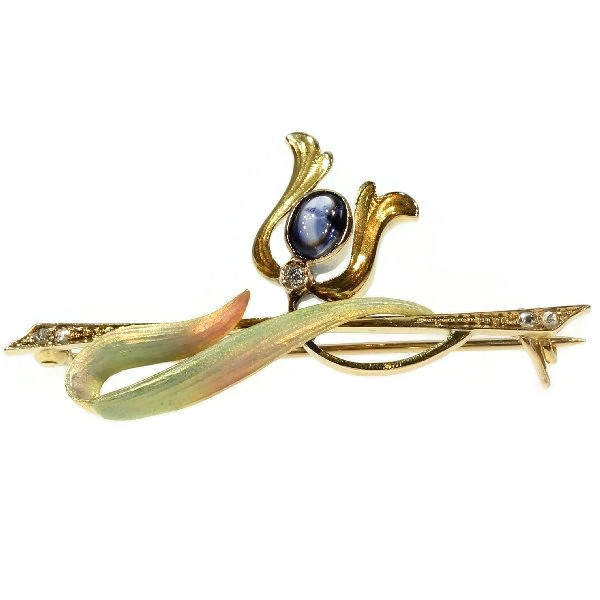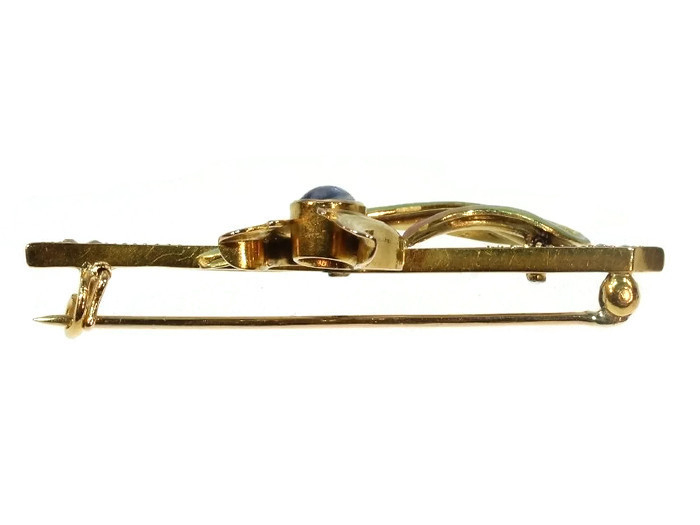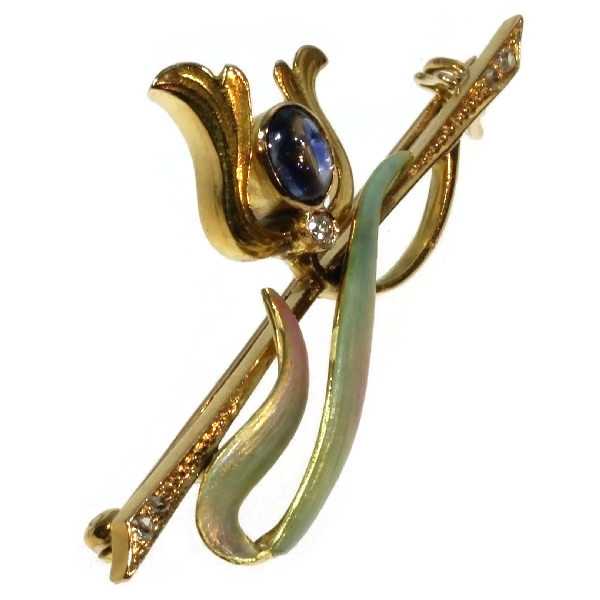We offer layaway, spread payments on the piece of your dreams. Ask us for details. Free insured shipping on all orders !!!
Enameled Art Nouveau brooch with diamonds and sapphire
As the vernal tulip of this 18K yellow gold Art Nouveau brooch from 1890 whirls sprightly around the horizontal bar with widening diamond-encrusted ends, so glimmers its cabochon cut sapphire bud whimsically together with the green and pink translucent enamelled linear leaf. It's almost as if the two tulip petals sprouting from an old European cut diamond reach out to be plucked by you.
Antique jewelry object group: bar brooch
Condition: excellent condition
- (more info on our condition scale)
Country of origin:
Although it does not carry any legible control marks we believe this to be of Belgian origin.
Style:
Art Nouveau - Art Nouveau (French for New Style) is an international movement and style of art, architecture and applied art - especially the decorative arts - that peaked in popularity at the turn of the 20th century (1890–1905).
The name "Art Nouveau" is French for "new art". It is also known as Jugendstil, German for "youth style", named after the magazine Jugend, which promoted it, and in Italy, Stile Liberty from the department store in London, Liberty & Co., which
popularised the style, and in Holland as “Sla-olie-stijl”, Dutch for “salad oil style” after a advertisement poster for this product that was made in that style.
A reaction to academic art of the 19th century, it is characterized by organic, especially floral and other plant-inspired motifs, as well as highly stylized, flowing curvilinear forms. Art Nouveau is an approach to design according to which artists
should work on everything from architecture to furniture, making art part of everyday life. Although Art Nouveau fell out of favour with the arrival of 20th-century modernist styles, it is seen today as an important bridge between the historicism of
Neoclassicism and modernism.
- See also: Art Nouveau
or more info on styles
Style specifics:
Art Nouveau - Although Art Nouveau took on distinctly localised tendencies as its geographic spread increase some general characteristics are indicative of the form. A description published in Pan magazine of Hermann Obrist's wall-hanging Cyclamen
(1894) described it as "sudden violent curves generated by the crack of a whip", which became well known during the early spread of Art Nouveau.
Subsequently, not only did the work itself become better known as The Whiplash, but the term "whiplash" is frequently applied to the characteristic curves employed by Art Nouveau artists. Such decorative "whiplash" motifs, formed by dynamic,
undulating, and flowing lines in a syncopated rhythm, are found throughout the architecture, painting, sculpture, and other forms of Art Nouveau design.(from: Wikipedia)
Period: ca. 1890
- (events and facts in 1890)
Source of inspiration: Mother Nature
Material: 18K yellow gold
- (more info on precious metals)
Technique:
Enamelling is an old and widely-adopted technology. The ancient Egyptians applied enamels to pottery and stone objects. The ancient Greeks, Celts, Russians, and Chinese also used enameling processes on metal objects. Enamel is the colorful result of
fusing powdered glass to a substrate by firing, usually between 750 and 850 degrees Celsius. The powder melts and flows and hardens to a smooth, durable vitreous coating on metal, glass or ceramic. According to some sources, the word enamel comes from
the High German word smelzan (to smelt) via the Old French esmail. Used as a noun, "an enamel" is a usually small decorative object, coated with enamel coating, such as a champlevé or a cloisonné (different techniques).
Diamonds:
One old European cut diamond with an estimated weight of approx. 0.03 crt.
and four rose cut diamonds
. We do not have the weight of the diamonds which is normal in our trade when it comes to rose cuts.
Note: All diamond weights, color grades and clarity are approximate since the stones were not removed from their mounts to preserve the integrity of the setting.
Total diamond weight: approx. 0.03 crt.
(without the rose cut diamonds)
Precious stones:
One cabochon
sapphire
- (more info on precious stones)
Birthstones:
Diamond is the birthstone (or month stone) for April
and sapphire for September.
- (more info on birthstones)
Hallmarks: "750" indicating 18K gold
- (more info on hallmarks)
Dimensions: width 5,00 cm (1,97 inch)
Weight: 7,10 gram (4,57 dwt)
Reference Nº: 15106-0181
Copyright photography: Adin, fine antique jewelry
all floral jewelry,
yellow gold jewelry,
jewelry with diamond,
jewelry with rose cut diamonds,
jewelry with sapphire,
latest acquisitions,
antique jewelry,
estate jewelry,
vintage jewelry or
modern jewelry
Jewelry with birthstones (or month stones) for:
January -
February -
March -
April -
May -
June -
July
August -
September -
October -
November or
December.
Additional information:
jewelry glossary -
wall of fame -
visit us in Antwerp -
subscribe to our mailinglist.
What is antique jewelry? -
What is estate jewelry? -
What is vintage jewelry?






